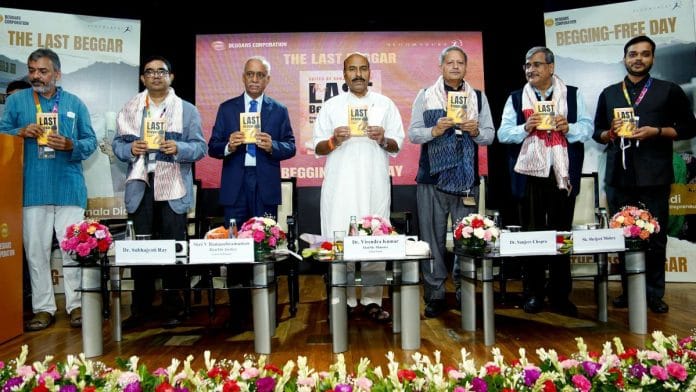New Delhi: A few years ago, Mirchmala Didi used to beg on the streets. But recently, she shared the stage with Union Minister for Social Justice and Empowerment Virendra Kumar at the launch of the book The Last Beggar. She has become the poster girl for Beggars Corporation — a Varanasi-based company that trains beggars, equips them with skills, and gives them work opportunities.
Mirchmala now makes and sells scarves, bags, and crocheted flowers to earn a living — with dignity.
“We make potli bags, normal bags, scarves and earn money by selling them,” Didi said confidently. She was speaking at the launch of the book by Beggars Corporation founder Chandra Mishra at Delhi’s Dr Ambedkar International Centre on 12 August.
This confidence, Didi said, comes from Beggars Corporation, which celebrated its third anniversary alongside the launch of The Last Beggar. The organisation’s model focuses on turning charity into enterprise.
Besides Union minister Virendra Kumar, the dignitaries at the event included National Human Rights Commission (NHRC) chairman Justice V Ramasubramanian, former LBSNAA director Sanjeev Chopra, Jaipur Institute of Management director Subhajyoti Ray, and former Chief Innovation Officer at Aditya Birla Group Shrijeet Mishra.
Published by Bloomsbury and edited by Sanjeev Chopra, The Last Beggar blends history, religion, and policy.
“Begging… no one is a beggar by choice. One of the myths we’ve created around ourselves is that beggars are lazy or don’t want to work. That myth gets totally destroyed,” said Chopra.
Also read: ‘Fat-shamers are now Ozempic-shamers’ — new book takes on India’s weight-loss obsession
‘A beggar-free India’
Beggars Corporation is a Varanasi-based enterprise run by Chandra Mishra. The government has recognised it as a social impact company, which trains and employs beggars, transforming them into entrepreneurs and taxpayers.
“Don’t donate, invest. We are not asking for your sympathy, we are asking for your support. Beggars can do business, beggars can make profit, and beggars can pay tax to the government,” said Mishra, at the launch attended by over a hundred people including policymakers, journalists, and students.
He pointed out that in Varanasi, former beggars are now paying GST and even income tax.
Outside the hall, a stall showcased Beggars Corporation products such as scarves, crocheted flowers, keychains, and bookmarks, priced between Rs150 and Rs 400. The products are also available through the company’s online store.
The book has contributions from multiple authors, including Sunita Aron, consulting editor at Hindustan Times, Sreevas Sahasranamam, professor at University of Glasgow, and Sanjeev Chopra.
“It’s no more a social issue, it’s a law-and-order problem,” said Aron, expressing hope that the corporation’s work would inspire governments to make India “beggar-free one day.”
From Glasgow, Sahasranamam sent a video message, recalling the launch of the Citizens for Begging Free India movement in June 2023. His chapter in the book focuses on Beggars Corporation’s “local-led venturing” model rooted in cultural contexts.
“For the beggar, it’s about rediscovering dignity. For the donor, it’s about moving from charity to investment,” he said.
Sanjeev Chopra, meanwhile, dismantled stereotypes at the launch, focussing on the plight of beggars.
“No one is a beggar by choice. Women and children are the most vulnerable. We have to convert charity into enterprise,” he said.
For Subhajyoti Ray, Beggars Corporation’s model is like the “bottom of the pyramid” theory, but inverted — instead of producing for the poor, it turns the poorest into producers.
“It will change when you internalise it… If you don’t act on it, it will remain,” Ray said, urging corporations to direct CSR funds toward the for-profit social enterprise.
In three years, Beggars Corporation has helped over 100 people earn Rs 10,000-30,000 a month, generating Rs 10 crore in economic activity.
Concluding the hour–long event, Mishra said that The Last Beggar is not the last book by him and future editions will chronicle more success stories as the movement grows.
“We are in a dream world,” he told the gathering, gesturing to the hall. “We always believe in dreams — and here, they are coming true.”
(Edited by Aamaan Alam Khan)






